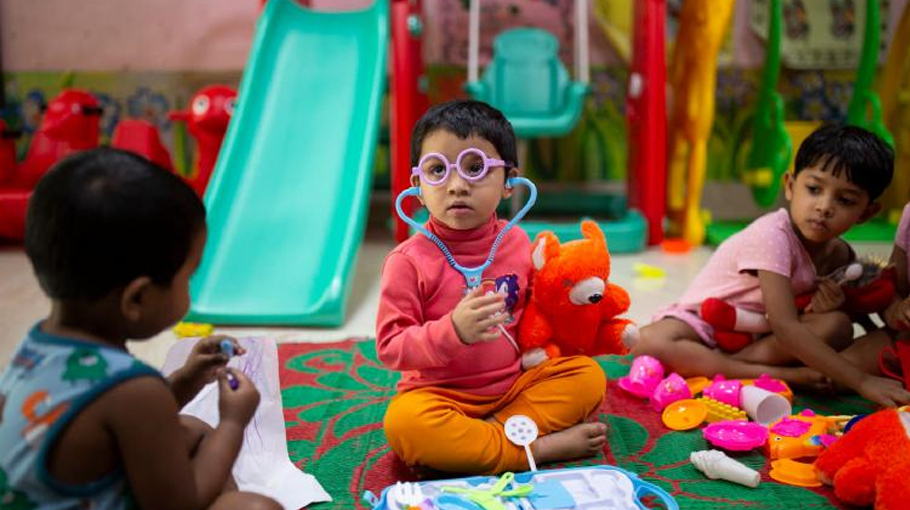Daycare and early childhood development

Bangladesh is celebrating its 5o years of journey and achieved remarkable economic growth over the last three decades. In recognition of rapid economic development, the UN general assembly adopted a resolution to allow Bangladesh to graduate from the least developed countries (LDC) after 45 years of inclusion. This credential economic growth has changed our family structure, especially in the urban areas, and created a new demand for daycare for the urban working mothers. The core function of the daycare center is to focus on early childhood development which has paramount importance on a child’s physical, emotional and social development. A good daycare center means a center that can ensure proper child care and has a child-friendly environment and working mothers feel well if their children are in safe hands and getting the care they deserve. We know that Dhaka is one of the most highly densely populated megacities in the world. And most of the families are nuclear and it is mandatory for parents to work to fulfill their daily life expenditures which are increasing day by day. The whole scenario actually pushes the working mothers to send their children to the daycare center. Undoubtedly, a care center is a great relief for working mothers. There are some 63 low-cost government daycare centres across the country and out of which 35 are located in Dhaka. There are also some private daycares centres in Gulshan, Banani, Dhanmondi, Mohammmadpur, and other residential areas of Dhaka. In 1974 Qudrat-e-Khuda Education Commission has suggested early childhood care and 36 years later in 2010 government of Bangladesh recognized pre-primary education as an integral part of primary education and approved an operational Framework to introduce one-year pre-primary education for all children 5 to below 6 ages. The comprehensive Early Childhood Development Policy (2013), Operational Framework for Pre-primaryEducation (2008), and Pre-primary Curriculum (2011) are the important policies and guidelines for implementing early childhood care, learning, and development in Bangladesh. Several studies were conducted on early childhood care and development focusing on guardians’ attitudes towards daycare centers and the relational effect of daycare centers on child’s age. In recent years, we found that many daycare facilities have opened in various areas of the capital.
Unfortunately,those daycares have a lack of associated facilities. There is not enough information about the operational modes and service-providing procedures of those daycares in Dhaka city. The majority of the daycares in the Gulshan, Banani, and other residential areas are not affordable for most middle and upper-middle-class urban working mothers in Dhaka.
There are some 63 low-cost
government daycare centres across
the country and out of which 35 are located in Dhaka.
There are also some private daycares centres
in Gulshan, Banani, Dhanmondi, Mohammmadpur and other
residential areas of Dhaka
Some recent studies indicate that the guardians have mixed reactions to the services in early childhood development through physical, social, emotional, cognitive development, and school preparation of the daycare center as well. Although Early Childhood Development emphasizes the holistic development of the children and includes optimum growth and mental development; therefore, focusing on physical, emotional, social, and cognitive development.
The facility of a good outdoor playground for the children is not enough in most of the daycares in Dhaka city; although the urban children in their physical development playground are a vital issue. According to a child’s mother, the majority of the caregivers have no proper training on ECD and she is unhappy with caregivers’ formal training on ECD.
Another child-mother said that the daycare is better for the children to stay in the daycare center rather than keeping alone at home. According to a child physician Dr. Bimal Chandra Das, building, interior finishes, outdoor spaces, selection of equipment, and room arrangement has a profound impact on children's learning and behavior. He added that the environment promotes and positively supports the child's interaction with space, materials, and their peer group.
Finally, daycare centers should enhance their services by ensuring security for toddlers, a hygienic and healthy environment, and pre-schooling facilities through training nannies or employees. There is enough scope to improve a child-friendly environment and reduce the monthly charges of the day-care center in Dhaka city. Women are working in the daycare centers which contribute to our national economy. To empower women this daycare service should be spread all over the country.
Faria Sultana is Senior Lecturer at Department of English, Fareast International University,
Dhaka, Bangladesh




